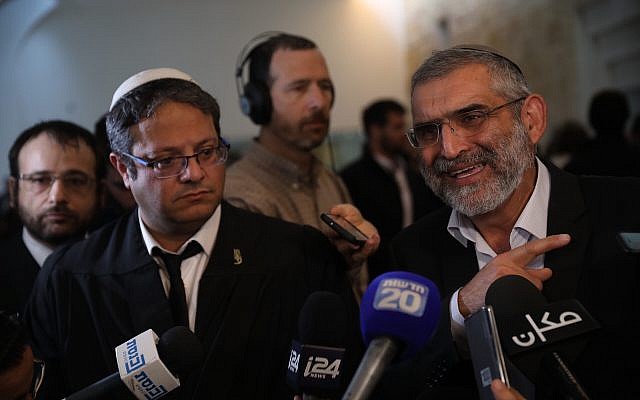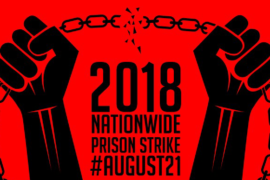Israel’s Supreme Court overturned three separate rulings by the Central Elections Committee this week, reversing the committee’s decision to permit Michael ben-Ari (Otzma Yehudit) to run for the Knesset, and striking down decisions to bar the Palestinian United Arab List-Balad ticket as well as Ḥadash party candidate Ofer Cassif.
The court, already widely criticized for its elitist political stances and activist nature, accepted arguments put forth by the Meretz party and the American-based Reform movement, claiming that Ben-Ari had made anti-Palestinians statements that constituted incitement to racism.
Since it was first announced that the kahanist Otzma Yehudit party would run together with the national religious Bayit Yehudi and National Union factions on a joint list in the April 9 elections, prominent Israeli and Diaspora Jewish figures have issued hysterical statements about what the inclusion and legitimization of ultra-nationalist kahanists could mean for the future of the Jewish state.
But those frightened by the prospect of kahanism spreading and gaining closer proximity to power should understand that Otzma is actually not the primary threat.
At the end of the day, kahanism is essentially Zionism for the ḥaredi community. It’s the ḥaredi Jewish worldview and dogmatic approach to Torah mixed with a very muscular nationalism. In fact, Rabbi Meir Kahane himself was a product of both the ḥaredi Mir Yeshiva & Z’ev Jabotinsky’s rightist Betar youth movement.
With its extraordinarily high birthrates, Israel’s ḥaredi sector is the fastest growing population between the Jordan River and Mediterranean Sea. The combination of this population growth with its astronomical unemployment figures sets a limit on how long the community will be able to sustain itself economically without entering Israel’s military and workforce. But once it does enter Israeli society and embrace the basic nationalist tenets of that society, it will undoubtedly bring with it an upsurge of “soft kahanism” that will impact the nation’s political landscape.
Many of the Israeli and Diaspora Jewish voices decrying Otzma’s likely inclusion in the next Knesset have attempted to paint the kahanists as Israel’s version of the European far right or America’s Ku Klux Klan. But these clumsy parallels only fit when Israel is contextualized as the Western nation Meretz, the Supreme Court and powerful Diaspora Jews desperately want it to be. When viewing Israel within the context of a Semitic society in the Middle East, however, one could employ more nuance when appraising Otzma and its voter base.
Rather than judging our politicians by the policies they express support for (it’s generally not too smart to take politicians at their word), we should try seeing these parties as loosely representing socio-cultural “tribes” in Israeli society with unique grievances, aspirations and prioritizations of values.
This perspective enables us to see past the sensationalist rhetoric, mudslinging and campaign promises so we can understand what actually drives our political figures and parties beneath the surface. Once we get a deeper sense of the tribes each political party represents, we should be able to discern new possibilities for what could be if certain societal shifts were to take place.
Kahanists are really no worse on Palestinian issues than most other tribes in Israeli society, almost all of which relate to Palestinians as not only an unwanted population but also as part of a much larger enemy collective that has repeatedly attempted to destroy the State of Israel.
But unlike most parties, from Meretz to National Union, Otzma follows this perception of Palestinians to its logical conclusions. And if Palestinians really were to be the spearhead of broader Arab and/or Islamic efforts to annihilate Israel, it might even make sense to buy into kahanist rhetoric.
But anti-Palestinian rhetoric is only a surface issue – a symptom of a much deeper problem. Even from within the Knesset, Otzma wouldn’t have any meaningful control over major policies. They would more likely be a tiny faction making noise from the opposition benches. The deeper issue that urgently needs tending, however, is the way each people here psychologically experiences the Other – the problematic role Palestinians play in Israel’s broader national story, as well as the role we Israelis play in the Palestinian story.
When addressing the roles we play in each others narratives, Otzma and their base might actually be more part of the solution than the problem. The kahanists are ultra-nationalists deeply, albeit narrowly, connected to Jewish identity and history. They experience themselves living as characters in the same story as their Biblical ancestors and relate to modern political issues through the lens of an exclusivist Jewish narrative. Their antagonism towards Palestinians comes less from racism and more from a contextualization of Palestinians as a population at war with the children of Israel.
The deep tribalism and Biblical mentality of the kahanists is in many ways much closer to some of Israel’s neighbors than to the European-influenced Zionism of Israel’s elites. Loyal to how they see the tradition of Biblical Israelite heroes, kahanists might be more willing to use violent force against anyone deemed an enemy of the Jewish people, but they are also hyper-critical of the colonialist features of Israeli society, which they rightly view as assimilationist.
The relations between kahanists and Palestinians is closer to that of two native tribes locked in conflict with one another than that of colonizer and colonized. Like the “hilltop youth” subculture, kahanists are an ideological group that feels alienated from – and oppressed by – the state. This ultimately creates space for a healthier relationship dynamic once the two sides are no longer at war.
While Otzma might represent an extremist and ugly expression of the deep Jewish nationalism that covertly drove the Zionist movement at its inner core, the Blue & White party of Benny Gantz and Yair Lapid represent all the external husks of that movement in need of being discarded – most notably its colonialist features, worship of military strength, desire for the “normalization” of Jews among nations (westernization) and the dehumanization of Palestinians as “lesser people.”
Yet it’s ironic that many of the very same Jews fear mongering over Otzma are also hypocritically promoting the Blue & White party as the best means to bring down Prime Minister Binyamin Netanyahu (Likud). In addition to representing a military establishment and defense industry that sells arms to human rights abusers abroad, Gantz casually brags about the violence he’s inflicted on Palestinians. He relates to Palestinians not as an enemy tribe but as inferior humans he can wipe away with superior weapons.
Men like Gantz and Lapid essentially want Israel to exist as an island of Western civilization in an otherwise “savage” region – or a “villa in the jungle” as former Prime Minister Ehud Barak has put it. Barak’s quote is as important as it is expressive because he is very much Gantz’s predecessor as the political manifestation of the Israeli tribe Blue & White represents in current elections. The State of Israel envisioned by this tribe would exist as a perpetual American client state completely disconnected from its neighbors.
The Blue & White vision for Israel could never successfully indigenize into the Semitic region, meaningfully change the role we play in the Palestinian story or alter the way we view Palestinians. Their ideal Israel would continue to see itself as dependent on Washington for its survival and would therefore remain trapped in the classic middle agent oppressor role thrust on the Jewish people by the capitalist system.
It’s easy to criticize Otzma Yehudit. Kahanists are low hanging fruit. But scapegoating them prevents us from dealing with some very real problems in Israeli society – namely how we as a collective relate to Palestinians. The answer isn’t to silence and delegitimize anyone willing to advocate discriminatory or violent policies against a minority population nearly all of Israeli society views as unwanted antagonists, but rather to change the roles Palestinians and Israelis play in each other’s larger national stories.





